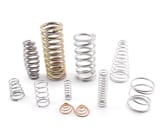 How is spring steel made? As a material vital to numerous industries, in regard to its applications and unique properties, spring steels hold particular characteristics that set it apart from other types of steel. Besides it most obvious application—spring steels are used in manufacturing springs—the material is also used to manufacture a diverse array of products from antennas, saw blades, lock picks, and automobile suspensions to washers, knives, binder clips, tape measures, aircraft landing gear, knives, swords, and much more.
How is spring steel made? As a material vital to numerous industries, in regard to its applications and unique properties, spring steels hold particular characteristics that set it apart from other types of steel. Besides it most obvious application—spring steels are used in manufacturing springs—the material is also used to manufacture a diverse array of products from antennas, saw blades, lock picks, and automobile suspensions to washers, knives, binder clips, tape measures, aircraft landing gear, knives, swords, and much more.
As this diversity of products suggests, a principal reason that spring steels are viewed so favorably as a material by manufacturers is due to its characteristics. More than simply unique, it relates to the original question at hand—how is spring steel made?
Spring steel actually refers to a group of medium-to-high carbon, low alloy steels that are defined by their excellent yield strength. That yield strength—the material’s ability to be continuously twisted, bent, compressed, or extended, and then returned back to its original shape without any type of deformation whatsoever—is spring steel’s defining characteristic. Yield strength is achieved through a specific composition of the material when its made, but by hardening the steel alloy as well.
Composition and Properties
The selection of materials to use in spring steels, and spring fabrication and design in general is determined by knowing the tensile and yield strengths of the various alloyed metals. In making spring steel, in addition to its carbon content, which is generally in the range of 0.5 to 1.0 percent, spring steels may also be alloyed with combinations of nickel, manganese, chrome, vanadium, molybdenum or other elements.
However, the one stock alloy that is a must in the composition of spring steels is silicon. A material regarded for its durability, but also its ability to retain its shape and flexibility. Properties not only particularly well-suited for use in spring steel applications, but characteristics that help give the material its defining high yield strength. For spring applications, that flexibility allows the material to be deformed and then return to its original position once the load has been removed. Once the material has been formed, it is generally either cold drawn as wire or rolled into flat sheets that can be punched from flat stock.
In addition to their high yield strength, spring steels are also known for their great tensile strength and fatigue strength and have the capacity to be formed, shaped, and post-heat treated. These properties make this steel appropriate for a number of industrial applications. The tensile strength is obtained by the final heat treatment.
Hardening
The process of hardening spring steel is the other important step in giving the material its high yield strength. Hardening can occur through heat treatment or a process referred to as work hardening—the hammering, rolling, drawing or other physical means that can be applied to increase its hardness. Hardening via heat treatment, as the name suggests, is achieved by heating up the steel, and then quenching the material to bring it down to ambient room temperature. During heat treatment the steel is tempered to ensure that it does not become brittle as well as to prevent or relieve it of stress. Heat-treated spring steel is used for such products as saw blades, knives, and flat springs. Work hardening methods are achieved by rolling the material to reduce its thickness. The process increases the material’s tensile strength and produces spring steel sheets, strips, rods, and bars.
As technology and engineering of springs continue to expand, springs today serve as integral components in the manufacture of numerous products. With the ever-increasing understanding of material sciences, spring steel applications will continue to play an important role in many industrial sectors. James Spring & Wire Company remains at the forefront of developing and providing high-quality spring parts and components. Our modern, state-of-the-art facility routinely produces precision springs and wire form components of the highest quality at the lowest cost. For more information, contact James Spring & Wire today.

